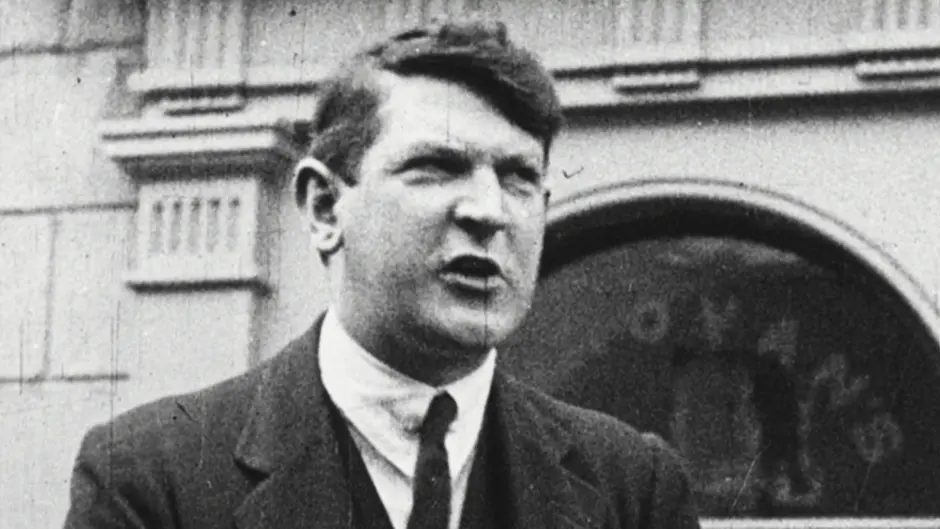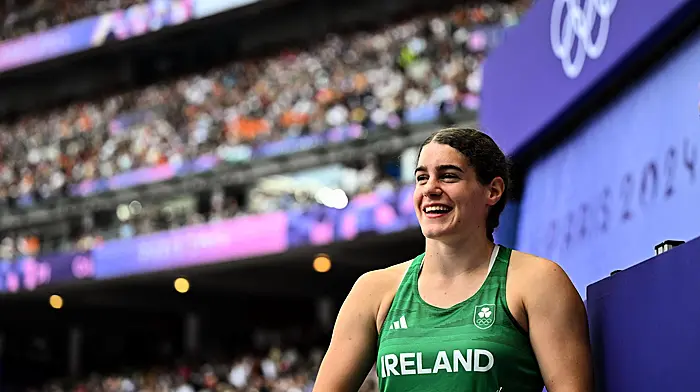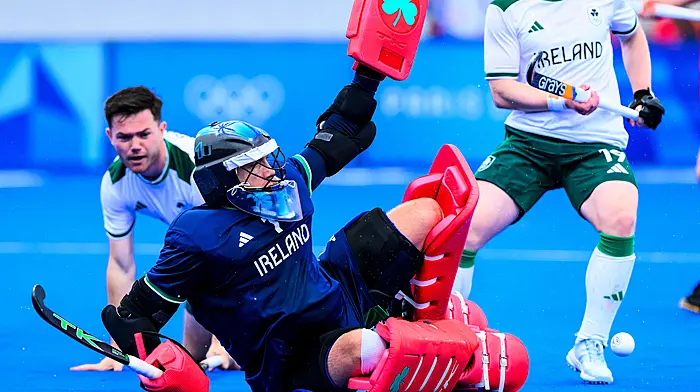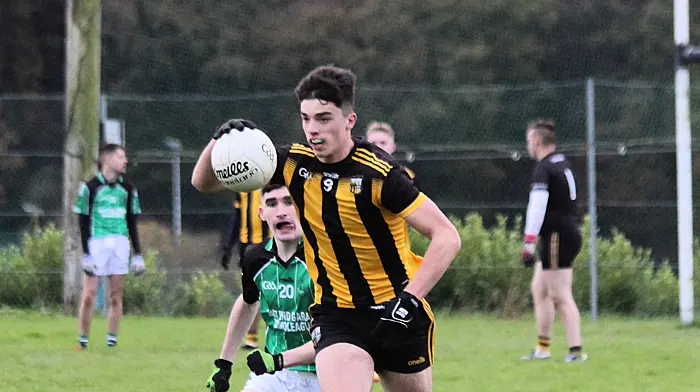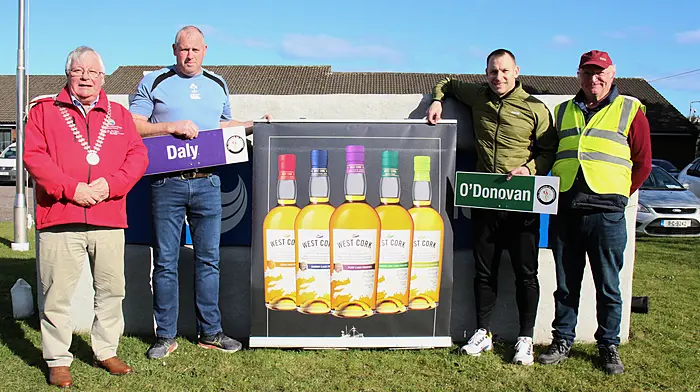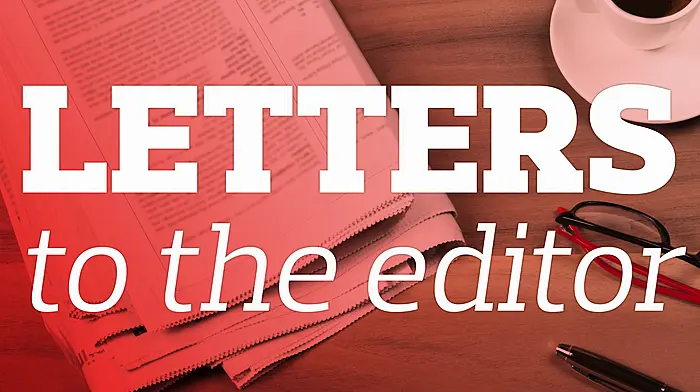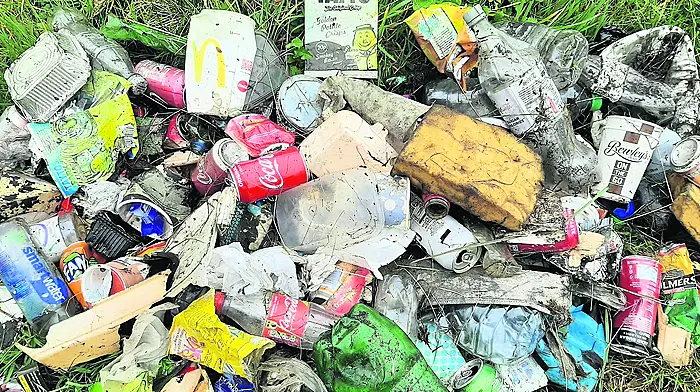This is an extended edit of the version that appeared in last week’s Southern Star Sport.
*****
THE question is often asked – did Michael Collins ever play football or hurling with Clonakilty?
Unfortunately, due to lack of club records from the first two decades of the 20th century, it is not possible to say with any certainty that, yes, Michael Collins did play with Clonakilty.
Bar one small piece of evidence all we can do is surmise from what we know of Collins as a young man and his interest in Gaelic games that he probably did. While we have proof of his participation in the GAA in London both as a player and as an administrator, no such proof exists of his GAA connections in West Cork. We can make a case for believing that he probably did play Gaelic games here in West Cork before he became too involved in his revolutionary activities from 1916 onwards.
Born in Woodfield, Lisavaird, in 1890, Michael began school at the age of five in Lisavaird N.S. The headmaster was Denis Lyons, a secret IRB organiser, later secretary of the Lisavaird branch of the All-for-Ireland League. A stern disciplinarian, he was a true nationalist whom Collins later credited with instilling a great pride of being Irish in his young pupils. Lyons, who had a special interest in raising greyhounds, provides us with a first possible connection with the GAA for the young Collins.
The GAA had arrived in West Cork in 1886-87 and most townlands fielded football teams. Lisavaird was not found wanting and fielded a team called the Lisavaird O’Connell’s, which played numerous challenge games. In one of the early Lisavaird teams we find the name D. Lyons, who must have been the son of Denis Lyons. Denis Jnr later went to live in Dunmanway, where he ran the Doheny Bar and we find the name D. Lyons again included in the Doheny team that won the county senior football title in 1897, the Munster title in 1898 and contested the All-Ireland final for Cork in 1899. The Lyons football blood was again shown when Denis Jnr’s grandson, Denis ‘DD’ Lyons, captained the Dohenys team that won the county junior football title in 1966.It is not a step too far to surmise that Denis Lyons, the headmaster, as well as watching his son playing with the Lisavaird team, also cultivated an interest in Gaelic football among his young students in school, Michael Collins in their midst.
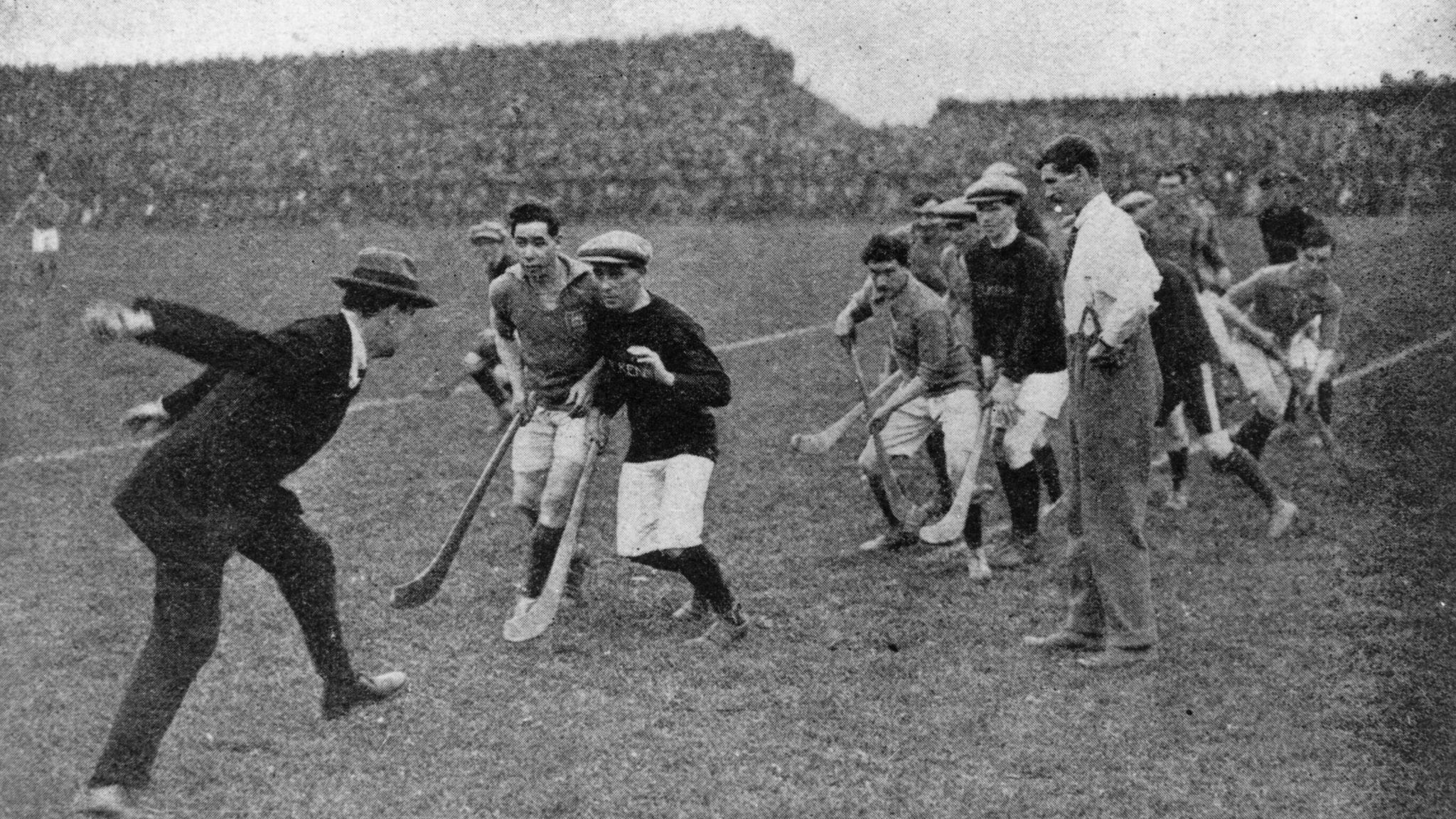 Michael Collins throws in the sliotar at the 1921 Leinster hurling final.
Michael Collins throws in the sliotar at the 1921 Leinster hurling final.
In March, 1896, Lisavaird O’Connell’s played Garralacky Shamrocks in two challenge games, the first at Sam’s Cross, where young Michael Collins lived. The field for the second game, by coincidence, was owned by a Mr M. Collins, who may well have been Michael John Collins, Michael’s father. One of the players on the Lisavaird team that year was a John Collins. Michael’s brother, Johnny, was 18 years of age in 1896 and it takes little imagination to see the young excited six-year old Michael cheering on his older brother Johnny on the Lisavaird team, playing in a field on their own farm.
It is said the young Michael Collins was a strong, well-built lad who revelled in physical activities, especially wrestling, football, hurling and bowling. He maintained a great interest in wrestling all his life, often initiating wrestling bouts with his IRA colleagues just to ease tension. While he played hurling in London with the Geraldine Club, it is doubtful he played it as a young boy in national school as there is no record whatsoever of hurling being played in the Clonakilty/Lisavaird area until 1904. He probably did enjoy bowling, or throwing scores as it is known, with his friends on the roads around Lisavaird but it is worth noting that bowling was banned by the police at that time and bowl-players could end up in court for bowling on the public road.
At the age of 13, in 1903, Collins was sent to live with his sister, Margaret, in Clonakilty, where her husband, Patrick O’Driscoll, ran a newspaper, The West Cork People. Michael’s future had been decided for him at that stage as he was sent to attend the Boys’ N.S., in Clonakilty where he would be prepared for the British Civil Service exams. This move brought him into direct contact with the GAA club in Clonakilty as the headmaster of the Boys’ school was John Crowley, a founder member of the Clonakilty GAA Club in 1887 and still active in the club when Michael arrived. That Crowley took a big interest in developing young players for the local club in the years that Collins attended the school can be gleaned from the fact that the Clonakilty football and hurling teams had a very successful period on the playing fields from 1912 to 1919, when those young boys had grown into young men. Some, like John ‘Flyer’ Nyhan, Stephen O’Neill and Patrick Harte, went on to play significant roles in the War of Independence, no doubt encouraged by their schooldays’ friend, Michael Collins.
Strangely, hurling did not take hold in West Cork until 1904/1905 and the Clonakilty hurling team came together for the first time to practice in late 1904, in the Showgrounds in Clon. The Showgrounds was only a few minutes’ walk from where Collins was living in Shannon (Emmett) Square and one can picture Collins and those young friends watching the new Clonakilty hurlers practising on the long summer evenings and even playing their own small games. Unfortunately, there were no underage GAA competitions in West Cork in those days so there are no records of those lads playing with the club. It is not surprising, therefore, that the young teenager, on arriving in London in 1906, decided to join the Geraldine hurling club.
In May, 1904, the first GAA games were played in the Clonakilty Showgrounds, known as the ‘Town Park,’ leased by the GAA club from the Agricultural Society, and you can imagine the excitement among the young lads when the venue hosted the first ever official West Cork football final on September 4th, Dohenys beating Skibbereen by 2-13 to 3-3. The Town Park was to become the mecca for Gaelic games in West Cork for the next fifty years and there is every chance that 14-year-old Michael Collins attended the first matches played there in 1904.
By 1907 Collins was a fine strapping young lad and we find the best proof that he did, indeed, play football with Clonakilty. In those days there were only two grades in championship football, Senior Firsts and Senior Seconds. Clonakilty had a fairly strong Firsts’ team, the championship being dominated by Carbery Rangers, but they also had a Seconds’ team, which, as always, was made up of a mixture of veterans and young aspiring teenagers. The captain was, in fact, one of the original players from 1888, Patrick ‘Tailor’ Santry, while Collins would have been one of the enthusiastic teenagers involved.
Collins had passed his civil service exams in 1906 and headed off to London that July to take up employment in the post office, a daunting task for any young lad. When Clonakilty Seconds played Rosscarbery in Ardfield in the first round of the championship in April, 1907, there was every chance Collins was home from London for an Easter break. Included on the Clonakilty team that day was ‘M. Collins.’ Clonakilty won by 1-3 to 0-1. The team was due to meet Skibbereen in the next round but the Skibb men conceded a walkover. In the semi-final, Clon met reigning champions, Ardfield, in November in Clon and won by 2-5 to no score. This put them into the final against Dunmanway which was fixed for December 8th in Bandon but a waterlogged pitch saw the teams having to return home without playing the game.
 Michael Collins with the Dublin hurling team in 1921.
Michael Collins with the Dublin hurling team in 1921.
The final was refixed for January 12th, again in Bandon and a large crowd saw Clon winning the title on a 1-4 to 0-4 score, in a tough battle on a slippery pitch. It was Clon’s first football title since 1893. The initials of the first names of all the players are given in the team list in The Skibbereen Eagle but right in the middle we find the full name, ‘Michael Collins.’ Was it possible that Collins was home on a Christmas break when the match took place? Or was it another Michael Collins altogether, we will never really know now but we like to think that the strange fact that his name is given in full indicates that the match reporter had some inkling that this young man was going to be heard of again. We would like to think that somewhere in his belongings Michael Collins had a Seconds’ medal won with Clonakilty as he headed off into history.
In later years, from 1917 onwards, when Collins was in the Clonakilty area, he liked to attend matches and meet up with his GAA friends after a match. He wrote in one letter that it was a great chance to recruit more men for the cause.
Did Michael Collins play for the Clonakilty GAA Club? I like to picture the young 14-year-old playing with his friends in the Town Park as the Clon hurlers and footballers trained, a custom that carried on for many years afterwards. That will do for me, until some relative unearths that missing 1907 medal. Ar dheis Dé go raibh siad uilig.

